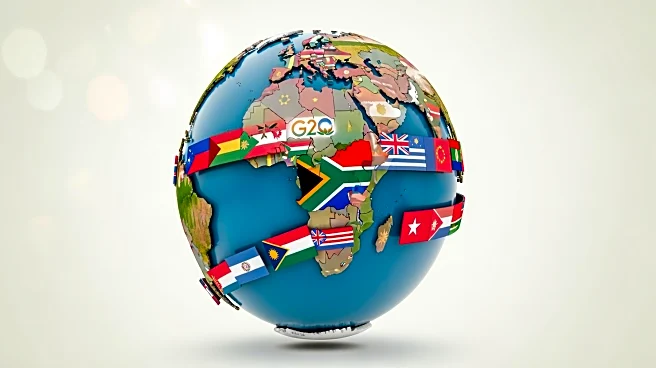What's Happening?
President Trump has expressed his desire for South Africa to be removed from the G20, citing issues with the country's treatment of its white minority. This statement comes as South Africa prepares to host the upcoming G20 summit. Trump, who will not
attend the summit, has criticized South Africa's inclusion in the G20, arguing that the country should no longer be part of the group due to its internal policies. The G20, an informal forum of the world's largest economies, operates by consensus and does not have a formal procedure for expelling a member. South Africa's government has not issued a full response to Trump's comments but has previously criticized the U.S. for prioritizing refugee applications from white South African Afrikaners. The G20 summit, which South Africa will host, focuses on global economic issues and includes representatives from the European Union and African Union.
Why It's Important?
The call for South Africa's removal from the G20 by President Trump highlights ongoing tensions between the U.S. and South Africa, particularly regarding racial and economic policies. This development could impact diplomatic relations and economic ties between the two nations. South Africa, as Africa's largest economy, plays a significant role in the G20, advocating for solidarity and sustainability. The U.S.'s stance may influence other G20 members' perceptions and decisions, potentially affecting South Africa's international standing. The situation underscores broader geopolitical dynamics, where economic and racial policies intersect with international diplomacy.
What's Next?
As South Africa prepares to host the G20 summit, it remains to be seen how other member countries will respond to President Trump's comments. The lack of a formal expulsion process in the G20 means that any decision to exclude South Africa would require consensus among member states. South Africa's focus on themes of solidarity and sustainability at the summit may serve to counteract negative perceptions and reinforce its commitment to global cooperation. The outcome of the summit and subsequent diplomatic engagements will likely shape future U.S.-South Africa relations and influence the G20's approach to membership and inclusion.
Beyond the Headlines
The tension between the U.S. and South Africa over G20 membership reflects deeper issues of racial and economic justice. South Africa's history of apartheid and its ongoing efforts to address racial inequalities are central to its national identity and international diplomacy. The U.S.'s criticism, particularly regarding land reform policies, touches on sensitive historical and cultural issues. This situation may prompt broader discussions within the G20 about the role of economic forums in addressing social justice and equality, potentially influencing future policy directions and international collaborations.















